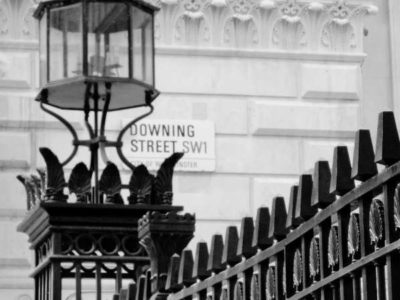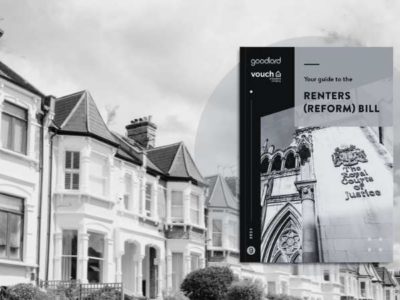The annual percentage change for average UK house prices was 3.5% in the 12 months to April 2023, compared with 4.1% in the 12 months to March 2023.
The average UK house price was £286,000 in April 2023, which is £9,000 higher than 12 months ago, but £7,000 below the recent peak in September 2022.
Average house prices increased over the 12 months to £306,000 (3.7%) in England, to £213,000 in Wales (2.0%), to £187,000 in Scotland (2.0%) and to £172,000 in Northern Ireland (5.0%).
On a non-seasonally adjusted basis, average UK house prices increased by 0.5% between March 2023 and April 2023, while average UK house prices increased by 1.1% during the same period 12 months ago.
Annual house price inflation was highest in the North East where prices increased by 5.5% in the 12 months to April 2023.
London was the English region with the lowest annual growth, where prices increased by 2.4% in the 12 months to April 2023.
The Royal Institution of Chartered Surveyors’ (RICS’) April 2023 UK Residential Market Survey reported a fall in demand.
When disaggregated, virtually all parts of the UK recorded either a negative or flat trend in home buyer demand, with the exception of Northern Ireland where a marginal rise was reported.
The Bank of England’s Agents summary of business conditions 2023 Q1 reported a modest pick-up in secondary market activity and requests for valuations, but said that demand was broadly equal to the supply of properties available.
The UK Property Transactions Statistics showed that in April 2023, on a seasonally adjusted basis, the estimated number of transactions of residential properties with a value of £40,000 or greater was 82,120.
This is 25.1% lower than 12 months ago (April 2022). Between March 2023 and April 2023, UK transactions decreased by 7.9% on a seasonally adjusted basis.
The Bank of England’s Money and Credit April 2023 release reported that mortgage approvals for house purchases, an indicator of future borrowing, decreased to 48,700 in April 2023, from 51,500 in March 2023.
England
In England, the April data shows that, on average, house prices have risen 0.5% since March 2023.
The annual price rise of 3.7% takes the average property value to £305,731.
The regional data for England indicates that:
- London experienced the greatest monthly price rise with an increase of 2.1%
- the South East saw the most significant monthly price fall, with a movement of –0.5%
- the North East experienced the greatest annual price rise, up by 5.5%
- London saw the lowest annual price growth, with an increase of 2.4%
Price change by region for England
| Region | Average price April 2023 | Annual change % since April 2022 | Monthly change % since March 2023 |
|---|---|---|---|
| East Midlands | £247,634 | 4.6 | 0.3 |
| East of England | £351,468 | 3.1 | -0.4 |
| London | £533,687 | 2.4 | 2.1 |
| North East | £159,900 | 5.5 | 1.8 |
| North West | £212,814 | 4.8 | 0.7 |
| South East | £391,766 | 3.5 | -0.5 |
| South West | £327,144 | 4.0 | 0.2 |
| West Midlands | £246,765 | 3.1 | 0.8 |
| Yorkshire and the Humber | £205,523 | 4.0 | 1.0 |
Repossession sales by volume for England
The lowest number of repossession sales in February 2023 was in the East of England and London.
The highest number of repossession sales in February 2023 was in the North West.
| Repossession sales | February 2023 |
|---|---|
| East Midlands | 7 |
| East of England | 5 |
| London | 5 |
| North East | 15 |
| North West | 27 |
| South East | 15 |
| South West | 6 |
| West Midlands | 9 |
| Yorkshire and the Humber | 10 |
| England | 99 |
Average price by property type for England
| Property type | April 2023 | April 2022 | Difference % |
|---|---|---|---|
| Detached | £484,512 | £463,203 | 4.6 |
| Semi-detached | £294,315 | £281,229 | 4.7 |
| Terraced | £247,025 | £241,429 | 2.3 |
| Flat/maisonette | £250,674 | £243,244 | 3.1 |
| All | £305,731 | £294,755 | 3.7 |
Funding and buyer status for England
| Transaction type | Average price April 2023 | Annual price change % since April 2022 | Monthly price change % since March 2023 |
|---|---|---|---|
| Cash | £286,225 | 3.4 | 0.6 |
| Mortgage | £315,442 | 3.8 | 0.5 |
| First-time buyer | £253,202 | 3.5 | 0.5 |
| Former owner occupier | £351,315 | 3.9 | 0.5 |
Building status for England
| Building status | Average price February 2023 | Annual price change % since February 2022 | Monthly price change % since January 2023 |
|---|---|---|---|
| New build | £456,247 | 25.4 | 10 |
| Existing resold property | £299,964 | 5.1 | -0.6 |
London
London shows, on average, house prices have risen 2.1% since March 2023.
An annual price rise of 2.4% takes the average property value to £533,687.
Average price by property type for London
| Property type | April 2023 | April 2022 | Difference % |
|---|---|---|---|
| Detached | £1,091,509 | £1,069,661 | 2.0 |
| Semi-detached | £694,457 | £672,007 | 3.3 |
| Terraced | £578,880 | £571,286 | 1.3 |
| Flat/maisonette | £444,368 | £432,906 | 2.6 |
| All | £533,687 | £521,313 | 2.4 |
Funding and buyer status for London
| Transaction type | Average price April 2023 | Annual price change % since April 2022 | Monthly price change % since March 2023 |
|---|---|---|---|
| Cash | £551,240 | 1.5 | 2.3 |
| Mortgage | £527,590 | 2.6 | 2.1 |
| First-time buyer | £459,789 | 2.5 | 2.0 |
| Former owner occupier | £614,413 | 2.3 | 2.2 |
Building status for London
| Building status | Average price February 2023 | Annual price change % since February 2022 | Monthly price change % since January 2023 |
|---|---|---|---|
| New build | £635,843 | 21.7 | 10.0 |
| Existing resold property | £527,232 | 2.0 | -1.3 |
Wales
Wales shows, on average, house prices have fallen by 1.3% since March 2023.
An annual price rise of 2.0% takes the average property value to £212,834.
There were 10 repossession sales for Wales in February 2023.
Average price by property type for Wales
| Property type | April 2023 | April 2022 | Difference % |
|---|---|---|---|
| Detached | £328,628 | £321,547 | 2.2 |
| Semi-detached | £208,033 | £201,573 | 3.2 |
| Terraced | £163,980 | £162,320 | 1.0 |
| Flat/maisonette | £134,725 | £132,528 | 1.7 |
| All | £212,834 | £208,620 | 2.0 |
Funding and buyer status for Wales
| Transaction type | Average price April 2023 | Annual price change % since April 2022 | Monthly price change % since March 2023 |
|---|---|---|---|
| Cash | £205,168 | 1.0 | -1.4 |
| Mortgage | £217,228 | 2.5 | -1.2 |
| First-time buyer | £182,661 | 1.9 | -1.3 |
| Former owner occupier | £248,606 | 2.2 | -1.3 |
Building status for Wales
| Building status | Average price February 2023 | Annual price change % since February 2022 | Monthly price change % since January 2023 |
|---|---|---|---|
| New build | £351,241 | 28.3 | 12.3 |
| Existing resold property | £210,160 | 6.1 | -0.2 |
Jeremy Leaf, north London estate agent and a former RICS residential chairman, comments:
“The market is entering a bumpy phase.
Just as buyers and sellers paused after last September‘s mini-Budget, so they are doing so again.
However, in our offices we are not seeing serious price corrections, renegotiation of previously-agreed terms or mass withdrawals.
There’s still plenty of cash and equity-rich buyers who want to profit from advantageous mortgage rates and price sensitivity so are negotiating hard.
Looking forward, we don’t expect much change until inflation and mortgage rates settle though some price softening is inevitable.”
Mark Harris, chief executive of mortgage broker SPF Private Clients, comments:
“At least inflation had been moving in the right direction, even if at a frustratingly slow pace – now with no movement this month, it will put further pressure on the Bank of England to hike interest rates yet again.
There is a strong argument for pausing the rate rises for now, giving the market time to settle down and adjust.
Consecutive base rate rises have been painful and done little to stem inflation; it’s time for a different approach, letting them take effect, rather than causing continued anxiety and distress for borrowers.”
Alex Lyle, director of Richmond estate agency Antony Roberts, comments:
“It’s a tale of two markets with prime stock new to the market selling and continuing to sell well, while strength of demand in the mainstream or core market, which is more reliant on relatively high loan-to-value mortgages, has dropped off a little, as has demand for flats.
There is no doubt some buyers are anxious and beginning to question the timing of their search, with potential vendors also wondering if it’s best to hold off and see what the market looks like in the autumn.
Twelve months ago, a property could launch with an ultra-ambitious asking price and go on to sell; whether or not it hit the asking price, it sold.
Properties coming to market now with ambitious prices are struggling to attract interest and are at risk of getting stuck.
Those compromised by location, lease or anything else are also struggling.
The fall-through rate has remained under control and pretty constant this year although deals are taking longer than most can remember and we are encountering more chains than ever.”
Tomer Aboody, director of property lender MT Finance, comments:
“Although property prices are still higher than they were a year ago, the pace of growth is slowing, underlining the lack of confidence or ability for buyers to actually buy.
With transaction volumes nearly 40 per cent lower than this time last year, one would have expected a higher rise in prices but with interest rate rises showing no sign of abating, many buyers are waiting to see how the market adapts and what the ‘new norm’ will look like.
Sellers who price attractively will be able to sell, but very few properties are now getting multiple bidders above asking price.
With the government pledge of halving inflation by the end of the year looking less likely, is it time to possibly start helping in the push to bring some confidence to the market?
Either lower rates and/or assistance in stamp duty are urgently required.”
Jean Jameson, Chief Sales Officer at Foxtons, comments:
“The market is busier than expected and the volume of sales across London is in line with what we saw last year, despite the rise in interest rates.
Foxtons’ housing stock has significantly increased year-on-year and we’ve not seen a significant increase in stressed sellers in the residential market as a result of the interest rates rise.
Since the mini-budget, sellers have had to be slightly more competitive with their pricing in order to stimulate interest in their property.”
Tom Bill, head of UK residential research at Knight Frank, comments:
“The UK housing market spent the first few months of 2023 overcoming the impact of the mini-Budget.
The next hurdle is high inflation, which will keep upwards pressure on mortgage rates this year.
We expect house prices to fall by around 5% and transaction volumes will be squeezed as rate uncertainty persists.
That said, the wage growth driving core inflation higher is one of the reasons we don’t expect a steep double-digit decline in house prices.
Record levels of housing equity, the availability of longer mortgage terms, a stable banking system and the recent popularity of fixed-rate products should also prevent a collective cliff-edge moment for the UK housing market.”





















Comments